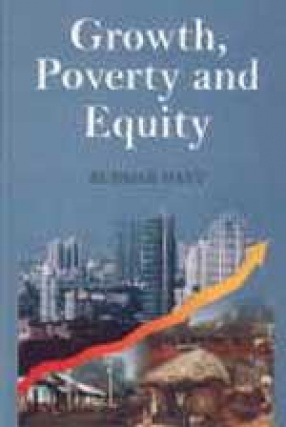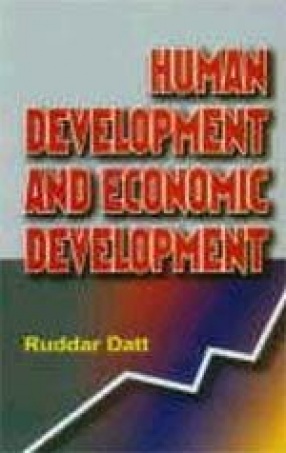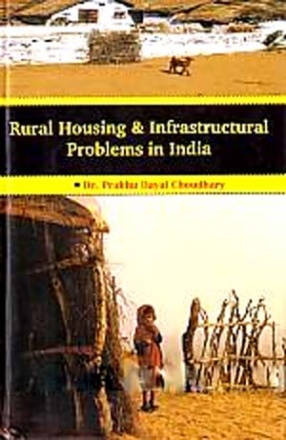Growth, Poverty and Equity by Professor Ruddar Datt is an attempt to examine whether India is able to attain the long-term objectives of maximum production and full employment, the attainment of equality and social justice for the poor and the downtrodden in our society. While India has become one of the fastest developing economies of the world, its record in reducing poverty and unemployment has not been very encouraging, more especially in the last two decades of reform. The country is faced with a paradox. India’s growth rate is likely to be 9-10 percent during the next decade, the country has 34 billionaires and its middle class, roughly 200 million is growing at a rapid rate. On the other hand, there is slowing down of poverty reduction with increase in GDP growth, increasing unemployment despite high GDP growth, decline in wage share and real wages of labour, widening gap between the living conditions of rural India (Bharat) and urban India. In 2004-05, India still had 300 million people below the poverty line. This is accompanied by a massive wave for establishing SEZs (Special Economic Zones)–a blatant example of subsidizing business tycoons, and on the other hand, there is prevalence of massive malnutrition among the poor, the growth of slums and serious shortage of housing for the poor and weaker sections.The sole aim of the book is arouse consciousness among thinking individuals that pursuit of growth is meaningless, if it does result in enlargement of employment for the millions of poor living in our society. The slogan of development should not be survival of the fittest, it should be the survival of the unfittest. This is the message of the book.
View cart “Human Development and Economic Development” has been added to your cart.
Growth, Poverty and Equity: Story of India’s Economic Development
by Ruddar Datt
$60.30
$67.00
In stock
Free & Quick Delivery Worldwide
All orders amounting to US$ 50 or more qualify for Free Delivery Worldwide. For orders less than US$ 50, we offer Standard Delivery at $14 per book.
ABOUT THE AUTHOR Ruddar Datt
Prof. Ruddar Datt started his career as teacher of Economics in 1952 at Vaish College, Rohtak (Haryana) and later in 1957 joined GMN College, Ambala Cantt. In 1959, he took over as Head of the Department of Economics at ARSE College, New Delhi where he worked for a period of 12 years. He was invited by the University of Delhi to work as Planning Officer in 1971. Thereafter, in 1972 he was appointed as the Principal of the School of Correspondence Courses and Continuing Education, University of Delhi- the post which he held for a period of 22 years and retired in May 1995. Presently, he is Visiting Professor at the institute of Human Development, New Delhi. Prof. Datt was elected as the President of the Indian Economic Association in 1991. He was also elected as the President of Indian Society of Labour Economics in 1991. Professor Datt has specialized in the study of the problems of Indian Economy, more especially I areas of economic reforms, employment policy and labour. He was invited by the Planing Commission in 2001 to be a member of Special Group on Targetting 10 Million Employment Opportunities per Year. Earlier he participated in the Study Group on Development of Small Scale Enterprises set up by the Planning Commission in May 1999 as a member. His major publications are: Indian Economy (1965), 47th Edition published in 2003; Dictionary of Technical Terms in Economics (English-Hindi-1974), India’s New Economic or Pannacea (1993); Workers Participation and Workers’ Ownership (1993); Cost of Distance Education in India (1994); Second Generation Economic Reforms in India (2001); Economic Reforms in India- An Appraisal (2001). In 2001, he completed a research study on the subject of ‘Lockouts in India- A Case Study of West Bengal. Besides, he has published an number of articles in reputed journals, such as The Indian Economic Journal, The Indian Jounal of Labour Economics and IASSI Quarterly. He has been a frequent contributor to the Business Line, Mainstream, Financial Express and Economic Times.
reviews
0 in total
Review by Anonymous
Be the first to review “Growth, Poverty and Equity: Story of India’s Economic Development” Cancel reply
You must be logged in to post a review.
Bibliographic information
Title
Growth, Poverty and Equity: Story of India’s Economic Development
Author
Edition
1st ed.
Publisher
ISBN
8184500882
Length
xxiv+368p., Tables.
Subjects








There are no reviews yet.